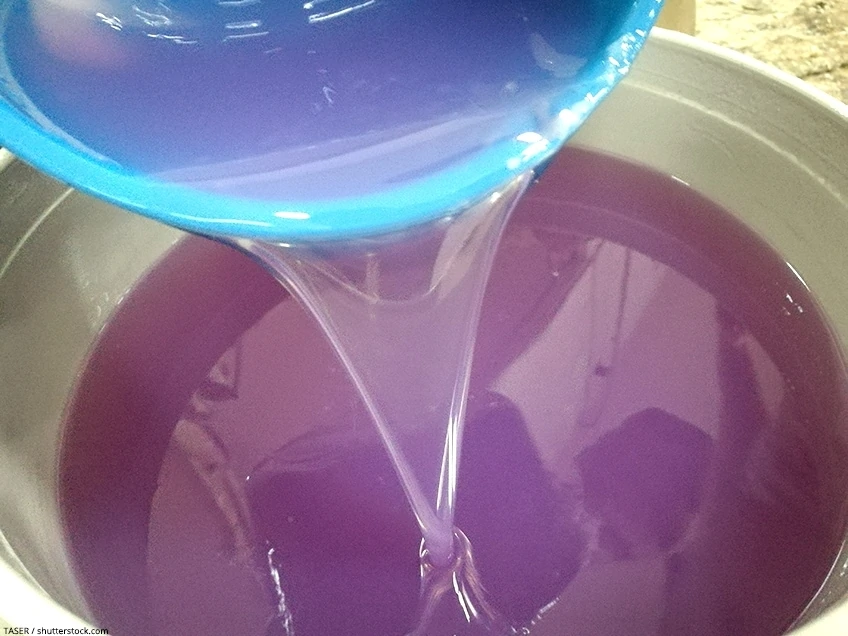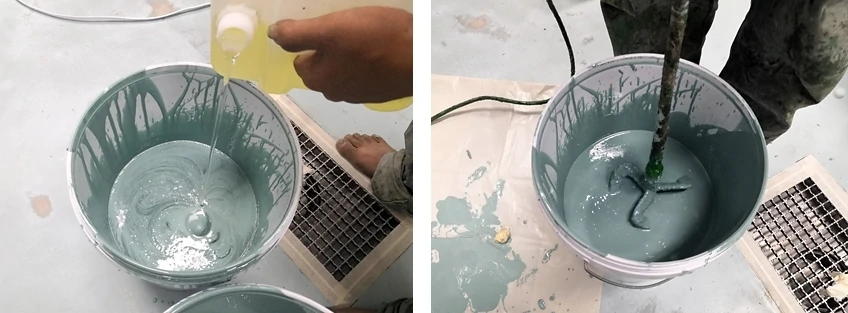
If you want to work with resin, you are spoilt for choice. There are several different resins available on the market, and each type has its advantages and disadvantages – including polyurethane casting resin. In our Polyurethane Resin Guide, we give you the most essential polyurethane casting resin properties and tell you what to look out for when buying polyurethane.
Table of Contents
Generally speaking, polyurethanes are synthetic resins or plastics that result from a polyaddition reaction between dialcohols or polyols and polyisocyanates.
Polyurethane casting resin has a wide range of properties that vary from application to application and cover a wide range of possibilities. Thus, not only thermoplastics but also thermosets and elastomers are produced from it.
In general, the casting resin consists of a two-component system of resin and hardener, which hardens after mixing through a chemical reaction. PU casting resins can, just like epoxy resin and polyester resin, be combined with various additives as well as filling materials or colorants. This gives them the desired properties. For example, the user can add an inhibitor to the resin to increase the so-called pot life, i.e., the processing time. As a result, this can be made very variable to suit any application.
There are also color pigments and fluorescent dyes that can give the polyurethane resin a specific color. This allows you to adapt the resin to your own requirements. Examples of fillers are, among others, cotton flocks, glass fibers, mineral fillers, and lightweight fillers. With these, the user can influence properties such as mechanical strength, stiffness, or surface hardness.
Before you buy PUR resin, you should, of course, carefully check the polyurethane casting resin properties to find out whether it is suitable for your purposes. In general, PU cast resin is a very pleasant material with many advantages and only a few disadvantages.
Pros
Cons
PU resins that have to be processed quickly, but at the same time can also be unmolded quickly, are generally called fast-casting resins. If you want to work with such a resin, you must, therefore, pay attention to the pot life, otherwise the material hardens too quickly, and you have to start again from the beginning. This can be seen as a disadvantage, but also as an advantage, because after all, it also results in it being quick to unmold.
If you want to buy polyurethane resin, you should also check the hardness level and whether it is suitable for your project. The degree of hardness is indicated in Shore and should be noted on the respective packaging. After curing, soft materials are indicated in Shore hardness A and harder materials in Shore hardness D. The former have a rubber-like consistency.
The areas of application for PU resin are incredibly diverse. Polyurethane casting resin is a fascinating material for both industry and the do-it-yourselfer.
For example, foams can be produced from PU, but also paints, adhesives, and coatings. However, PU also protects electronic assemblies from a wide range of environmental influences such as mechanical stress or moisture. Therefore, these are usually encapsulated.
But also for the production of damping and spring elements, casting tires, instrument transformers for medium and high voltage technology, drive elements as well as various wearing parts, the PU resin has become invaluable.
In contrast to the production of foam, where a reaction with water and the resulting foam formation is desired, in all other applications, the surfaces with which the liquid PU resin comes into contact should be completely dry. Otherwise, the polyurethane casting resin may lose its favorable properties.
Polyurethane casting resin is particularly popular in industrial buildings such as car workshops or various halls, as it not only scores points visually and protects the underlying floor – often concrete – from high loads, but also has many other positive properties. As a floor covering, it is abrasion-resistant and very elastic. It withstands not only high thermal but also mechanical loads and is easy to apply. Furthermore, it is not too cost-intensive.

In outdoor applications, it should be preferred over epoxy resin coating because, unlike the latter, it does not have a tendency to yellow due to its high UV resistance and can also withstand sharp temperature fluctuations optimally. Polyurethane resin coatings are also often used in kindergartens and schools, as they reduce the risk of slipping and accidents.
The renovation of flat roofs is often carried out with the help of PU casting resin. The casting resin offers significant advantages, as it is easy to apply and very durable. Here, too, the material’s high UV resistance comes into play.

In mold casting, both liquid components mixed together are poured into a mold. The material then hardens.
Due to its low viscosity and various other properties, polyurethane resin is ideally suited for mold casting, regardless of whether the mold is lost or reusable. However, if you want to cast polyurethane, there are two things to consider:

Fields of application for mold casting are, among others, the following:
mold casting enjoys great popularity both in industry and among small users and can be carried out not only by machine but also by hand. It is important that the casting resin is carefully mixed and poured slowly into the mold; otherwise, too many air bubbles will be added. After filling, you can lightly tap the filled mold with your fingers a few times to allow the air bubbles to escape. To avoid too much air being mixed in, you can fill the mold from below instead of pouring in the resin from above.
In industry, both casting compound and casting are dried in some plants using vacuum and degassed beforehand.

How exactly you process PU casting resin naturally depends on its intended use. In our polyurethane resin guide, we assume its use as a floor coating on concrete as well as mold casting.

Before the actual pouring of the PU resin, it is recommended that a base primer be applied as a floor coating. Images: bhakpong – stock.adobe.com

During the mixing process, it is strongly recommended to work extremely thoroughly. Images: Chinnabanchon9Job / shutterstock.com

Images: bhakpong – stock.adobe.com
When storing polyurethane casting resin, care must be taken to avoid large temperature fluctuations. In general, PUR casting resin should be stored at a temperature of 15 to 25 degrees Celsius in closed containers. Make sure that the packaging is airtight and moisture-proof when opened. Process the opened containers as quickly as possible and shake the two components carefully but thoroughly before mixing.
It is possible that the PU resin may crystallize slightly during storage. Then you can warm it up slowly and carefully to a maximum of 70 degrees Celsius to decrystallize it. In this case, let it cool down to room temperature before you process it further.
Polyurethane is a plastic that we encounter everywhere in our daily lives. It has various favorable properties which are not only used by industry but also by private users. PUR is created by an exothermic, i.e., heat-releasing polyaddition reaction.
Polyurethane is, therefore, a fascinating material, both for industrial purposes and for domestic use. Its easy application and its many positive properties enable a clean production even without much previous knowledge.
This site uses Akismet to reduce spam. Learn how your comment data is processed.